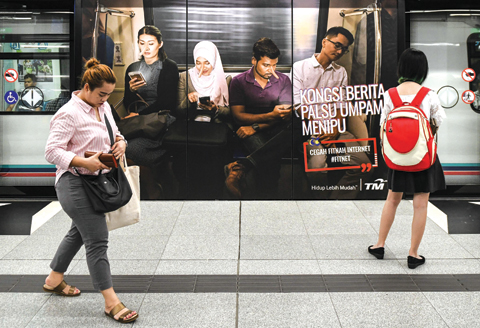 KUALA LUMPUR: Commuters wait for the train in-front of an advertisement reading ‘sharing a lie makes u a liar’ at a train station in downtown Kuala Lumpur yesterday.— AFP
KUALA LUMPUR: Commuters wait for the train in-front of an advertisement reading ‘sharing a lie makes u a liar’ at a train station in downtown Kuala Lumpur yesterday.— AFPKUALA LUMPUR: The Malaysian government yesterday proposed a "fake news" law which would carry a maximum 10-year jail term, including for articles published abroad, sparking fears of a crackdown on dissent as elections loom. Governments in several countries, emboldened by US President Donald Trump's fulminations against "fake news", are considering such legislation. But rights groups warn that authoritarian regimes are likely to use such laws to silence opposing voices.
Malaysian Prime Minister Najib Razak has already been targeting critics in politics and the media who have attacked him over allegations that huge sums were looted from sovereign wealth fund 1MDB. Najib and the fund deny any wrongdoing. The proposed law, introduced in parliament Monday, fuelled fears the government is seeking to intensify a clampdown before a general election, which must be called by August but is widely expected sooner. Opposition MP Charles Santiago said the bill was "a powerful weapon for the government to silence dissent in the country". "It is timed for the elections and to silence discussions on 1MDB," he said.
The bill, which described fake news as a "global concern", includes a maximum 10 years in jail or fine of up to 500,000 ringgit ($130,000) for anyone guilty of creating or disseminating what authorities deem to be fake news. It said anyone-including foreigners-who breaks the law outside the country by publishing fake news can face punishment in Malaysia, as long as what is published concerns Malaysia or a Malaysian citizen. Fahmi Fadzil, spokesman for the opposition People's Justice Party, said it suggested the government was seeking to target foreign media, which have led the coverage of 1MDB.
Phil Robertson, Asia deputy director for Human Rights Watch, accused the Malaysian government of employing "Trump-style scare tactics to grant itself powers to arbitrarily determine what people can say about Malaysia in the world". Amnesty International said the bill was "nothing but a blatant attempt to shield the government from peaceful criticism". It was no coincidence that it had been tabled with general elections just around the corner, said Amnesty's regional director James Gomez in a statement.
Taking aim at fake news
Malaysia's traditional pro-government media have reported on the 1MDB controversy only occasionally and in a muted and largely uncritical fashion. Despite the concerns, cabinet minister Wan Junaidi Tuanku Jaafar insisted the law "will not be abused", adding: "It is not aimed at silencing critics." The bill must be approved by a majority in the 222-seat lower house and also in the upper house, and this is likely as both chambers are controlled by the ruling coalition. It needs to go through several readings in parliament before it passes.
Malaysia is ranked 144th out of 180 countries in Reporters Without Borders' World Press Freedom Index. The government has the power to revoke newspapers' printing permits and regularly attacks critical media, particularly online news sites that have gained a following by reporting on official malfeasance and corruption. Other countries in Southeast Asia have also been taking aim at what they claim is fake news.
Philippine lawmakers are mulling an anti-fake news bill introduced last year by a supporter of President Rodrigo Duterte, who has done battle with media outlets critical of his deadly drug war. The proposed legislation reserves its harshest penalties, up to $382,500 and imprisonment of up to 20 years, for mass media organizations that refuse to take down fake news items. In tightly-controlled Singapore, a parliamentary committee has been holding hearings this month as it examines potential measures to combat false online information, including legislation.- AFP




